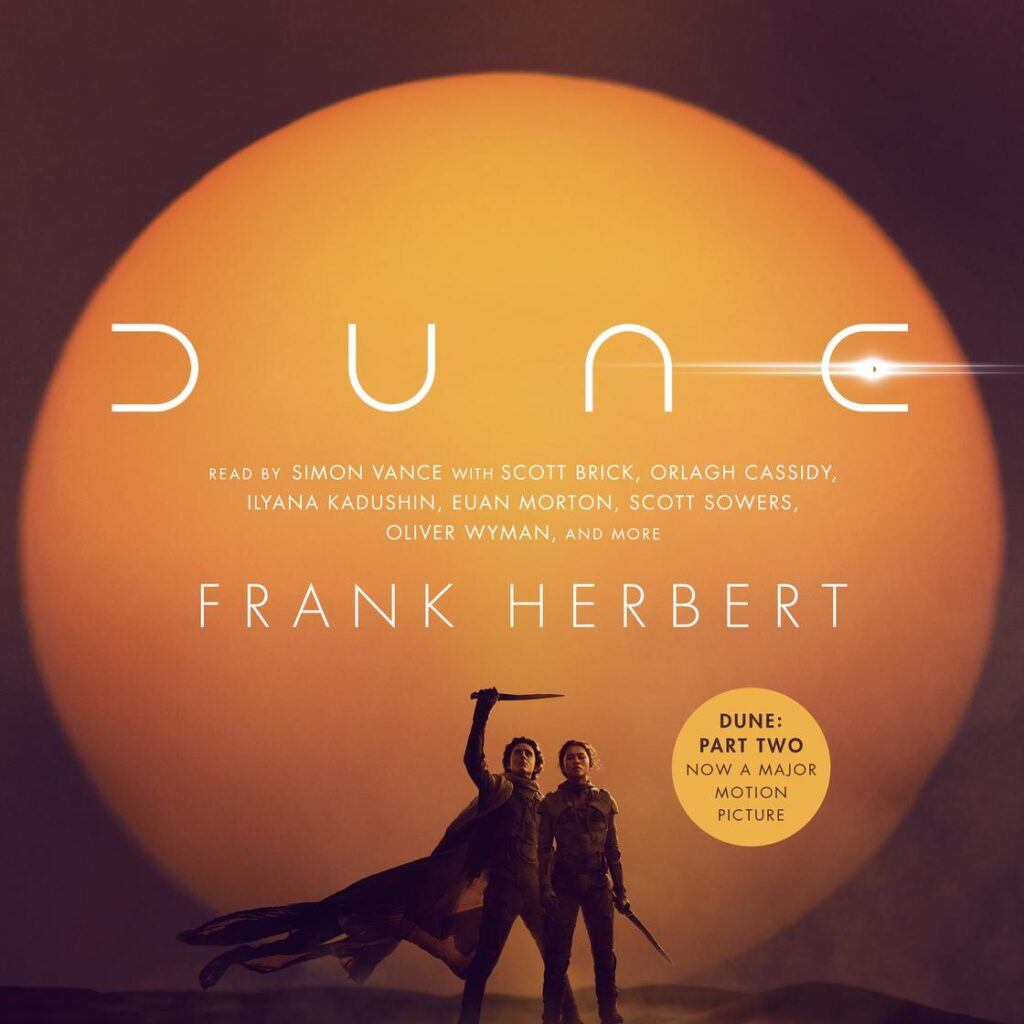
Prior to embarking on my Dune audiobook journey, I had little knowledge of this epic tale or its film adaptations. I have to say Frank Herbert’s masterpiece is worth the read. Dune is an intricate saga of struggle, legacy, resource management, and greed. At its core are Paul Atreides and his mother, Lady Jessica, who are deeply trained in the Bene Gesserit ways of reading people’s intentions and, for Paul, seeing possible visions of the future.
The story unfolds with the assassination of Paul’s father, Duke Leto, who knowingly walks into a deadly trap laid out by the treacherous Baron Harkonnen and the Emperor. The trap draws the Atreides family from their lush home world of Caladan to the arid desert planet of Arrakis, a land rife with giant sandworms and deadly storms. This harsh new environment is the sole source of the universe’s most valuable substance: the spice drug melange. Leto knows he’s being played but believes that the natives of Arrakis, the Fremen, are a worthwhile ally and that they can work together to solve the planet’s problems and form a better relationship with the Emperor. But, plots within plots and deep mistrust define the relationships between the various factions vying for control over the spice trade.
After the assassination of Leto, Baron Harkonnen puts his nephew in charge of Arrakis and is grooming another nephew to take over his place. Paul, the rightful ruler, narrowly escapes death and hides out in the desert with his mother Jessica. Paul and Jessica’s story aligns with a Bene Gesserit legend and the Fremen hiding them believe they are the ones spoken of in the legend. Paul may be destined to be the planet’s saviour, but as the narrative progresses, the line between hero and potential tyrant blurs.
The story is mostly told from Paul’s perspective but there are several passages recited by Princess Irulan, the eldest daughter of the Emperor. The excerpts from her journals and published works offer insight into the world of Dune, the Bene Gesserti way, and the legend of Paul, or Muad’Dib — the name adopted by Paul after he was accepted by the Fremen as one of their own.
In many ways the Bene Gesserti teachings act as a religion or yogic practice.
“I must not fear. Fear is the mind-killer. Fear is the little-death that brings total obliteration. I will face my fear. I will permit it to pass over me and through me. And when it has gone past, I will turn the inner eye to see its path. Where the fear has gone, there will be nothing. Only I will remain.”
This mantra, recited by Paul, encapsulates the essence of his training and the mental fortitude required for him to survive and thrive on Arrakis.
Yet Paul and Jessica’s abilities to perceive and influence the future also raise fascinating philosophical questions about destiny and free will. I find myself thinking about elements of this book more than I thought I would.
I love reading, but listening to Dune was excellent. The narration and sound effects expertly draw you into the world and add depth and dimension to the story. It’s also not surprising that the themes of Dune are as relevant today as they were when the book was first published in 1965. The struggle for resources, the dynamics of power, and the complexities of leadership and legacy resonate with the political struggles we see today. This is a story about colonialism, Imperialism, violence, and ecology.
The political intrigue and the multilayered conspiracies make for complex world-building equal to that of StarWars and Lord of the Rings. Herbert’s detailed descriptions paint a vivid picture of a desert planet and its original inhabitants and the tensions with its colonizers. The presence of the formidable sandworms and the harsh, stormy environment of Arrakis add to the sense of awe and danger that permeates the story.
I left the book wondering about Paul. He begins as a sympathetic character, yet his journey raises questions about the corrupting influence of power. Herbert leaves it unclear if Paul remains a hero or if he has succumbed to the very forces he sought to overcome. This ambiguity appeals to me, and it gives the novel a depth that’s missing from the binary good-evil of the StarWars series. I think there’s more to reflect on here about the nature of leadership and morality.
If you enjoyed the intricate political maneuvering and epic scale of Star Wars or the fantastical world-building and complex characters in the Wings of Fire series, then Dune is a must-read. Its blend of science fiction, adventure, and profound thematic exploration makes it a timeless classic.
Dune is available on Audible and through Libby, or from any one of Canada’s lovely independent bookstores (oh, yes and Amazon).
And if you’re interested in a deeper look into politics, ecology and what was happening in the 60s when this book was published, give this essay a read.